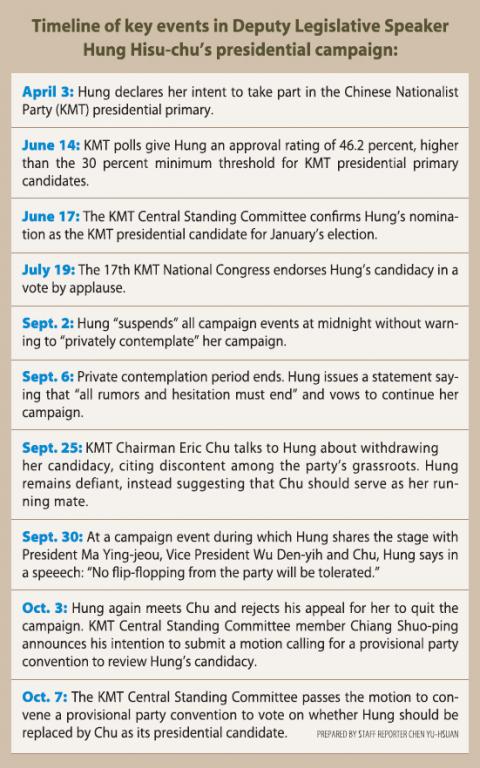There was a time when the Chinese Nationalist Party (KMT) and President Ma Ying-jeou’s (馬英九) administration could console themselves with at least one perceived advantage over the Democratic Progressive Party: their cross-strait policy.
That KMT presidential candidate Hung Hsiu-chu (洪秀柱) managed to squander even that advantage away explains why the KMT now appears it would stop at nothing to annul her candidacy.
The fundamental weakness of Hung’s campaign is her radical pro-unification ideology, which has prompted the top echelons of the Presidential Office, the KMT and “elders” with the pan-blue camp to unite in calls for her to withdraw from the presidential race.

If she were allowed to continue, Hung’s cross-strait platform — a mess for which Hung has only herself to blame — would doom not only her campaign, but also those of KMT legislative candidates.
A KMT rout from the legislature would be the kind of nightmare scenario in which the party’s continued existence would not be guaranteed. Yet Hung apparently remains oblivious to the disaster she has created.
Therefore, KMT leaders have in recent days demonstrated considerable resolve in neutralizing Hung, running roughshod over procedural niceties, as well as public opinion.
The KMT Central Standing Committee on Wednedsay unanimously passed a resolution to call an extraordinary party congress to deliberate a proposal to replace her.
Although the KMT headquarters’ drastic methods prompted criticism, Hung’s stubborn and unthinking refusal to confront the matter has left the KMT no choice — “whatever the costs, Hung must go.”
KMT Chairman Eric Chu (朱立倫) voiced the discontent of grassroots members when he panned her cross-strait policy as out of touch with mainstream public opinion.
However, Hung brushed Chu off and blithely attributed the public furor over her China policy comments to “flawed communication.”
Ultimately, Hung’s self-righteous belief in her role as a champion of “truth,” and her indifference to the survival of KMT legislative candidates, are the reasons the KMT has “collectively disidentified” with Hung.
Hung’s cross-strait stance relies heavily on the ideas of Chang Ya-chung (張亞中), an academic with strong pro-unification views; crucially, Hung’s China policy discourse goes above and beyond Ma’s.
After Hung heedlessly crossed the Ma government’s “China-policy red line,” Ma had no choice but to sever his support for Hung.
A pan-blue camp politician once said that if, for the sake of argument, one concedes that the KMT is “pro-China,” then in comparison with the KMT, Chang and his ilk are “just red.” Left unchecked, the “red tide” from Hung’s campaign would crush the KMT as surely as it has crushed Hung.
Translated by staff writer Jonathan Chin

ANOTHER EMERGES: The CWA yesterday said this year’s fourth storm of the typhoon season had formed in the South China Sea, but was not expected to affect Taiwan Tropical Storm Gaemi has intensified slightly as it heads toward Taiwan, where it is expected to affect the country in the coming days, the Central Weather Administration (CWA) said yesterday. As of 8am yesterday, the 120km-radius storm was 800km southeast of Oluanpi (鵝鑾鼻), Taiwan’s southernmost tip, moving at 9kph northwest, the agency said. A sea warning for Gaemi could be issued tonight at the earliest, it said, adding that the storm is projected to be closest to Taiwan on Wednesday or Thursday. Gaemi’s potential effect on Taiwan remains unclear, as that would depend on its direction, radius and intensity, forecasters said. Former Weather Forecast

As COVID-19 cases in Japan have been increasing for 10 consecutive weeks, people should get vaccinated before visiting the nation, the Centers for Disease Control (CDC) said. The centers reported 773 hospitalizations and 124 deaths related to COVID-19 in Taiwan last week. CDC Epidemic Intelligence Center Director Guo Hung-wei (郭宏偉) on Tuesday said the number of weekly COVID-19 cases reported in Japan has been increasing since mid-May and surpassed 55,000 cases from July 8 to July 14. The average number of COVID-19 patients at Japan’s healthcare facilities that week was also 1.39 times that of the week before and KP.3 is the dominant

The Chinese Communist Party’s (CCP) working group for Taiwan-related policies is likely to be upgraded to a committee-level body, a report commissioned by the Mainland Affairs Council (MAC) said. As Chinese President Xi Jinping (習近平) is increasingly likely to upgrade the CCP’s Central Leading Group for Taiwan Affairs, Taiwanese authorities should prepare by researching Xi and the CCP, the report said. At the third plenary session of the 20th Central Committee of the CCP, which ended on Thursday last week, the party set a target of 2029 for the completion of some tasks, meaning that Xi is likely preparing to

US-CHINA TRADE DISPUTE: Despite Beijing’s offer of preferential treatment, the lure of China has dimmed as Taiwanese and international investors move out Japan and the US have become the favored destinations for Taiwanese graduates as China’s attraction has waned over the years, the Ministry of Labor said. According to the ministry’s latest income and employment advisory published this month, 3,215 Taiwanese university graduates from the class of 2020 went to Japan, surpassing for the first time the 2,881 graduates who went to China. A total of 2,300 graduates from the class of 2021 went to the US, compared with the 2,262 who went to China, the document showed. The trend continued for the class of 2023, of whom 1,460 went to Japan, 1,334 went to